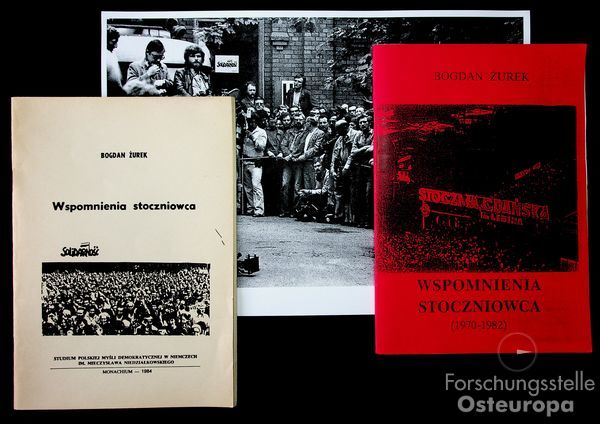Kolloquiumsvortrag
18:15 Uhr, / Zoom
Benjamin Goossen (Boston)
Mennonites and Lebensraum. Situating a Christian Denomination in Hitlers Empire.
Wissenswertes
August '80 through the eyes of a strike participant
Bogdan Żurek and the birth of „Solidarność“In the summer of 1980, a wave of workers' protests flooded communist-ruled Poland. The main reason for the protests was the price increase introduced by the authorities, who were at first able to calm the strikes by accepting several social demands of the workers. Eventually the strikes started again at the Gdańsk Shipyard when Anna Walentynowicz – an opposition activist and a long-time crane operator in the shipyard – was fired. During these events, Lech Wałęsa, an electrician in his thirties, became a prominent leader of the trade union and mass social movement "Solidarność" ("Solidarity"), which grew immensely during these strikes. In honor of the anniversary of the famous strike, this year we present Bogdan Żurek’s Memories of the Shipyard Worker. It shows not only the events of August '80, but also the historical background of 1970 – the year of a bloody pacification of workers' protests in Poland – until the martial law period.
Bogdan Żurek had worked at the Gdańsk Shipyard since 1971. In the second half of the seventies, he had some relations with the opposition, sometimes distributing non-censored press, but summer 1980 represented a great shift in his life. He participated in the strike at the Gdańsk Shipyard and in the creation of Solidarity; he also worked in departments of the Young Poland Movement, one of the most important opposition groups in the country. Consequently, he was arrested under martial law and spent six months in prison. Thereafter, like many people in such circumstances, Bogdan Żurek decided to emigrate from Poland. However, this decision did not stop his political activity. He became involved in the work of Radio Free Europe, was active in the émigré structures of the Polish Socialist Party and was published in the émigré press. He also continued his public activity after 1989, becoming one of the leading Polish community activists and journalists in Germany.
Bogdan Żurek vividly describes the beginnings of his work at the shipyard, when he learned about the history of the bloody suppression of the workers' protests in December 1970 from perfunctory statements by his colleagues who were reluctant to talk about it. Through his memories, we can learn much about the working conditions of the shipyard workers. In winter, there was a lack of heating, and in summer a lack of ventilation. Poor lighting resulted in a large number of accidents, with cramped conditions and lack of protective clothing contributing further to the already precarious circumstances. The workers were exhausted due to the necessity of implementing unrealistic work plans. The rebellion that took place in the summer of 1980 opens the main part of Żurek's narrative. It describes in detail the course of the protest and honestly depicts the role of the main historical actors during the strike. In the following parts of the book, together with the protagonist, we experience the sixteen-month period in which "Solidarity" could work legally, although struggling to survive under martial law.
Both editions of Bogdan Zurek's memoirs came to Bremen as part of the collection he donated to the Research Centre for East European Studies. The collection also contains photos taken during the strike. In one photo we can see a slogan written on the wall of the shipyard: "We with the people, the people with us, we shipyard workers will not give up!". Bogdan Żurek's Memories shows that the strikers kept their promise.
Jan Olaszek
Further reading:
Arkadiusz Kazański: Bogdan Żurek, Encyklopedia Solidarności.
Tomasz Kozłowski: Anatomia rewolucji. Narodziny ruchu społecznego „Solidarność” w 1980 roku, Warsaw 2017.
Jan Olaszek works in the Institute of National Remembrance and the Institute for Political Studies at the Polish Academy of Sciences. He primarily deals with the history of the underground publishing movement in communist Poland. In summer 2018, he conducted research at the Research Centre for East European Studies thanks to the Hans Koschnick Scholarship.
Länder-Analysen
» Länder-Analysen
» Eastern Europe - Analytical Digests
Discuss Data
Archiving, sharing and discussing research data on Eastern Europe, South Caucasus and Central AsiaOnline-Dossiers zu
» Erdgashandel
» Hier spricht das Archiv
» Russian street art against war
» Dissens in der UdSSR
» Duma-Debatten
» 20 Jahre Putin
» Protest in Russland
» Annexion der Krim
» sowjetischem Truppenabzug aus der DDR
» Mauerfall 1989


